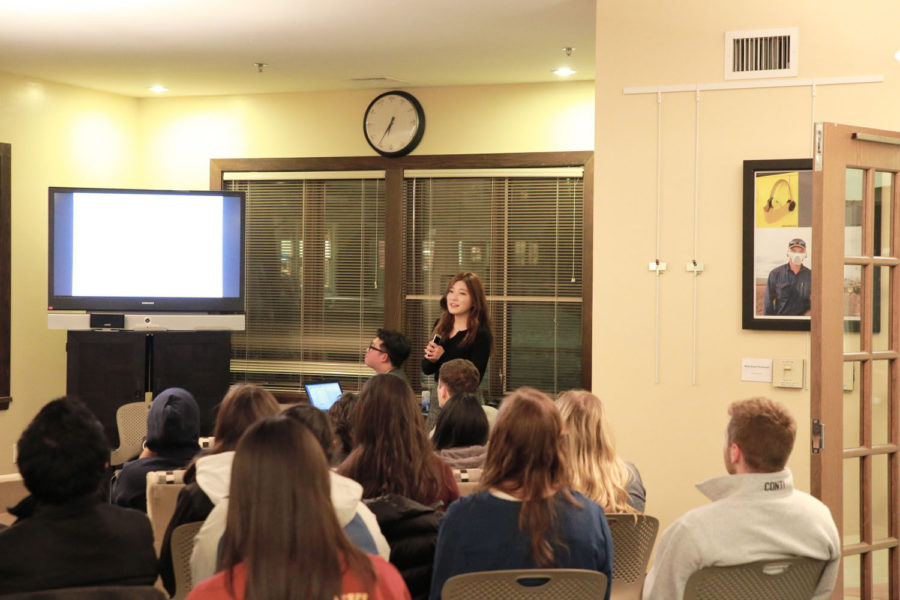Bringing culture to campus: iCU aims to diversify student relationships
February 11, 2015
Despite the falling snow on Feb. 4, the Asian American Cultural Center steadily filled with a mixture of students. A group set a spread of traditional Korean foods, including Bulgogi, a marinated meat dish; Kimchijeon, a pancake-like item; and Japchae, a dish made of sweet potato noodles, ready to share.
The event was part of iCU, an intercultural dialogue series put on by the Office of Inclusion and Intercultural Relations (OIIR). The event name stands for the slogan “Now I see what you mean.” The series began last semester as a way to connect international and domestic students on campus.
As people grabbed plates, they began to move and mingle with other attendees as the organizers set up the two presentations, one focused on music and one on Korean dramas.
Yun Shi, program director for international education at the Center, said the topics come from co-host organizations, students, the Study Abroad office and the interns at the International Education office. The wide variety of sources is meant to keep topics relevant, unique and interesting, according to Shi. The theme for the iCU event was based around Korean pop culture, but the series will cover topics like Korean cooking techniques and the Lunar New Year in the coming weeks.
Shi said the program allows domestic students to widen their world view by learning about new cultures and combating stereotypes. The conversations also help international students feel welcome on campus and enjoy the U.S. culture.
Get The Daily Illini in your inbox!
“In a safe space and informal (and) friendly environment, with people interested in listening, learning and sharing, international students feel appreciated and valued for their contribution to the global understanding,” Shi wrote in an email. “They therefore become more comfortable in engaging in intercultural dialogues.”
Last semester, iCU focused on Chinese culture through ChinaTalks. Shi said because the events received positive feedback and were well-attended, with approximately 25 to 45 students coming each week, OIIR continued the series this semester with “K-wave,” which is hosted in conjunction with the Korean Student Association.
Teddy Bae, an organizer of the iCU discussion and sophomore in Engineering, opened his discussion with attendees by joking that it would not contain any i-Clicker questions. Bae’s discussion focused on the different facets of Korean pop, or K-pop, and the many reasons why its U.S. popularity has grown in recent years, as the attendees casually sat on brown couches.
Bae, who grew up in South Korea and is a member of the Korean Student Association, said he has always had an interest in Korean culture, especially after moving to Washington at the age of 16. Bae said that the growth in popularity of Korean culture is based upon advances in technology and communication because of the Internet.
The shift was apparent in students such as Aiden Rogers, freshman in LAS, who first encountered K-Pop around 2010, when she started listening to bands such as Shinee. Now, Rogers said that she has a particular taste in Korean music.
“I go for the ones (bands) with really good vocal talent and unique dances,” she said.
Rogers put her knowledge to use when her team took first place in a Jeopardy-style game of K-pop music and trivia.
Bae said the diversity at the University opens doors to learn from other people, and events like iCU provide a place to share and learn about other people outside the classroom.
The event drew a large crowd, but each student had his or her own motivation for being there.
Arailym Amangeldiyeva, freshman in LAS, and Mary Ondrejka, freshman in DGS, came to the event to fulfill a requirement for a class, but said they enjoyed the event while learning new facts about Korean culture.
Following the hour-long event, both Ondrejka and Amangeldiyeva said they were surprised by the event’s lively atmosphere.
“People are very open and sociable,” Amangeldiyeva said. “You get to come away from the busy parts of life and have fun while learning.”
David Lee, senior in LAS, agreed that the night was entertaining. He heard about the event when it was mentioned by the professor of his Korean class, but did not expect the dialogue of the event to come so naturally.
“I think humans stay in their comfort zones,” he said. “For me, talking to other Koreans is easy, (but) I like to expose myself to other cultures. I think there’s a lot to learn from that.”
He said that events like iCU help him connect with new people and empathize with others, a skill that he hopes to use in a future in mission work.
Rogers said that being at a large school gives her the opportunity to learn about other people in her everyday life. She said she doesn’t have to reach very far out on campus to be exposed to different cultures. She said she commonly hears music in a different language down the hallway of her residence hall and sees flyers for events like iCU, and her curiosity is sparked.
“It’s nice to learn about (the culture) from people who really know about it, not a third-party source,” Rogers said.
Isabella can be reached at [email protected].







